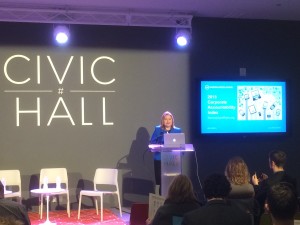07 Nov RDR @ the IGF
This year Ranking Digital Rights has a strong presence at the Internet Governance Forum, being held this coming week in João Pessoa, Brazil. We will be presenting the results of the Corporate Accountability Index and also engaging in broader discussions about standards for government and industry related to human rights and the Internet. An interactive schedule for the entire conference can be found here.
We are organizing two events:
Monday November 9, 2-6pm, Workshop Room 8 – “Day Zero” workshop: Corporate Accountability for Digital Rights: Building a Global Research and Advocacy Network.
UPDATE: The UN Special Rapporteur on Freedom of Expression, David Kaye, will deliver opening remarks
This will be an in-depth meeting to brainstorm ideas for how civil society groups and academic researchers can use the Corporate Accountability Index data and indicators for their own research and advocacy at national, regional, and global levels. Click here for more details about location and agenda, and to RSVP.
Wednesday November 11, 11am-12:30pm, Workshop Room 7 – Workshop: Benchmarking ICT Companies on Digital Rights. (Click here for remote participation information)
Session description: There has been growing interest over the past few years in civil society efforts to hold ICT companies accountable for their impact on human rights,. All stakeholders including companies have an interest in setting clear industry standards on dimensions of privacy and freedom of expression. To that end, more research and comparative data about different companies’ policies and practices can encourage companies to compete with one another on respect for users’ rights. Given the international scope and complexity of the sector, this task is more than any single organization can fully tackle on a global scale, and it is important to recognize the diversity of goals and perspectives represented by organizations working in this space. The purpose of this roundtable workshop is to bring together a geographically diverse range of NGO’s and researchers to share experiences and perspectives on creating projects to rank or rate ICT companies. The goal is to create a “how to” guide on launching such projects as well as a collaborative network of organizations and researchers. Company and government stakeholders will also provide feedback on how such projects can most effectively influence corporate practice and government policy.
Click here for updated session info and list of participants.

